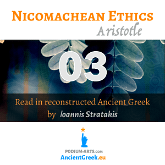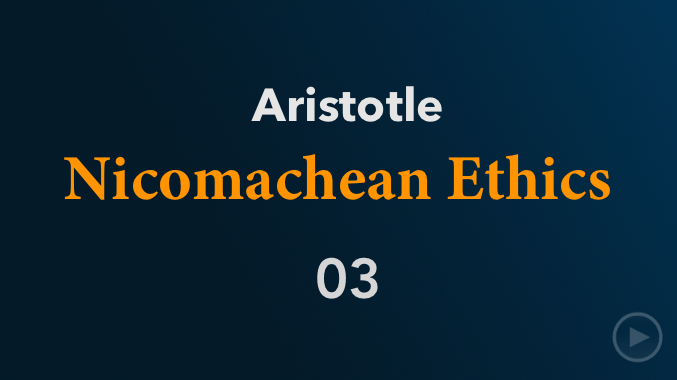• Nicomachean Ethics 03 •
• Aristotle •

Duration: 1 hour 6 min
Unabridged
Recorded: 2025
Price : $/€ 28 (audio) - 45 (video)
About “Nicomachean Ethics" 03 by Aristotle
In the third Book of the Nicomachean Ethics (Gr.: Ἠθικὰ Νικομάχεια), Aristotle shifts from discussing virtue in general to examining voluntary and involuntary action, which is key to understanding moral responsibility. He argues that only voluntary actions can be praised or blamed because they come from the agent’s own decision and understanding of the situation. In contrast, actions taken under force or ignorance are considered involuntary. However, Aristotle makes a distinction between true compulsion, where the agent plays no part in the act, and mixed cases—like actions taken under threat—where the act is chosen as the lesser evil. These cases are still voluntary to some extent, since the decision ultimately rests with the agent.
Next, he looks at ignorance as another reason for involuntary action. When ignorance relates to specific details—such as who is harmed or what is done—the action may be excused. On the other hand, ignorance of moral principles or universal truths does not excuse wrongdoing because this ignorance is a kind of vice. Moral responsibility relies on both awareness and choice.
The following significant theme is choice (prohairesis), which Aristotle defines as the thoughtful desire for things within our control. He explains that deliberation pertains to means rather than ends; the ends are shaped by our moral views, while deliberation identifies the best path to reach them. Therefore, rational choice is central to virtue. Good actions require both the right desire and the right reasoning.
Aristotle then categorizes the moral virtues linked to courage and temperance. Courage is the balance between rashness and cowardice; it involves a proper attitude toward fear and confidence, especially when facing death in battle. A courageous person acts based on reason and noble goals, not on feelings or ignorance. Temperance, on the other hand, controls desires for physical pleasures, especially those involving taste and touch. A temperate person enjoys pleasures correctly, guided by reason, while someone who indulges excessively becomes controlled by those pleasures.
Through these discussions, Aristotle lays out a practical basis for ethics: virtue is about rational choice, moderation, and awareness. Book 3 connects the theoretical study of virtue with the detailed look at moral character, showing that true moral excellence is not a passive habit but an active and reasoned choice.
You can follow the Greek text of “Nicomachean Ethics” book 3 by Aristotle, online at Archive.org.
Many editions with translation in English can be found at Archive Books.
about Aristotle
Aristotle (Gr.: Ἀριστοτέλης), one of the most important philosophers of Antiquity, was born in 385 BCE in Stageira of Chalkidike. Born in a rich family he had the opportunity to get high education. From 367 BCE on and for about twenty years, he studied philosophy in Athens by Plato and also taught in his Academy. After the death of Plato he moved to the city of Assus in Asia Minor, where he taught philosophy until 345 BCE., when he accepted an invitation by Theophrastus to teach in Mytilene. In 342 BCE King Philippus asked him to teach his 13 years old son, Alexander. After the death of Philippus Aristotle returned to Athens and established the “Lyceum”, where he set his teaching forth. However, after the death of Alexander in 323 BCE and having been accused by opponents for disrespect, he retired in Chalkis. He died in 322 BC from some stomach disease.
Aristotle left a lot of works. The works that have survived are distinguished in logical, physical, biological, psychological, metaphysical, moral, political, technological and various problems.
The Aristotelian works have included the following, which are not considered genuine: Physiognomy, About Miraculous Things Heard, About Colors, Mechanics, Rhetoric to Alexander and On Hearing.
About the audio~videobook
 The recording contains the complete, unabridged Ancient Greek text of the Aristotelian “Nicomachean Ethics book 3”. The videobook shows the highlighted Greek text simultaneously with the reading.
After purchase you will be able to download the relevant file(s), containing the work in mp3 a/o mp4 format.
The recording contains the complete, unabridged Ancient Greek text of the Aristotelian “Nicomachean Ethics book 3”. The videobook shows the highlighted Greek text simultaneously with the reading.
After purchase you will be able to download the relevant file(s), containing the work in mp3 a/o mp4 format.
The videobook comes with (optional) captions in English. Other languages on request.
You can listen to chapter 03 (03.03) of “Nicomachean Ethics, book 03”, an audio/video sample of the present audiobook. Please, click on the play-button bellow and, if you wish, follow the Ancient Greek text lower on the page, or alternatively watch the video, which is provided with a quick translation in English. Thank you!
ΗΘΙΚΑ ΝΙΚΟΜΑΧΕΙΑ 03.03
3. Ὄντος δ᾽ ἀκουσίου τοῦ βίᾳ καὶ δι᾽ ἄγνοιαν, τὸ ἑκούσιον δόξειεν ἂν εἶναι οὗ ἡ ἀρχὴ ἐν αὐτῷ εἰδότι τὰ καθ᾿ ἕκαστα ἐν οἷς ἡ πρᾶξις. (21) Ἴσως γὰρ οὐ καλῶς λέγεται ἀκούσια εἶναι τὰ διὰ θυμὸν ἢ δι᾽ ἐπιθυμίαν. (22) Πρῶτον μὲν γὰρ οὐδὲν ἔτι τῶν ἄλλων ζῴων ἑκουσίως πράξει, οὐδ᾽ οἱ παῖδες· (23) εἶτα πότερον οὐδὲν ἑκουσίως πράττομεν τῶν δι᾽ ἐπιθυμίαν καὶ θυμόν, ἢ τὰ καλὰ μὲν ἑκουσίως τὰ δ᾽ αἰσχρὰ ἀκουσίως; ἢ γελοῖον ἑνός γε αἰτίου ὄντος; (24) Ἄτοπον δὲ ἴσως τὸ ἀκούσια φάναι ὧν δεῖ ὀρέγεσθαι. Δεῖ δὲ καὶ ὀργίζεσθαι ἐπί τισι καὶ ἐπιθυμεῖν τινῶν, οἷον ὑγιείας καὶ μαθήσεως. (25) Δοκεῖ δὲ τὰ μὲν ἀκούσια λυπηρὰ εἶναι, τὰ δὲ κατ᾿ ἐπιθυμίαν ἡδέα. (26) Ἔτι δὲ τί διαφέρει τῷ ἀκούσια εἶναι τὰ κατὰ λογισμὸν ἢ θυμὸν ἁμαρτηθέντα; φευκτὰ μὲν γὰρ ἄμφω. (27) Δοκεῖ δὲ οὐχ ἧττον ἀνθρωπικὰ εἶναι τὰ ἄλογα πάθη· αἱ δὲ πράξεις τοῦ ἀνθρώπου ἀπὸ θυμοῦ καὶ ἐπιθυμίας. Ἄτοπον δὴ τὸ τιθέναι ἀκούσια ταῦτα.
